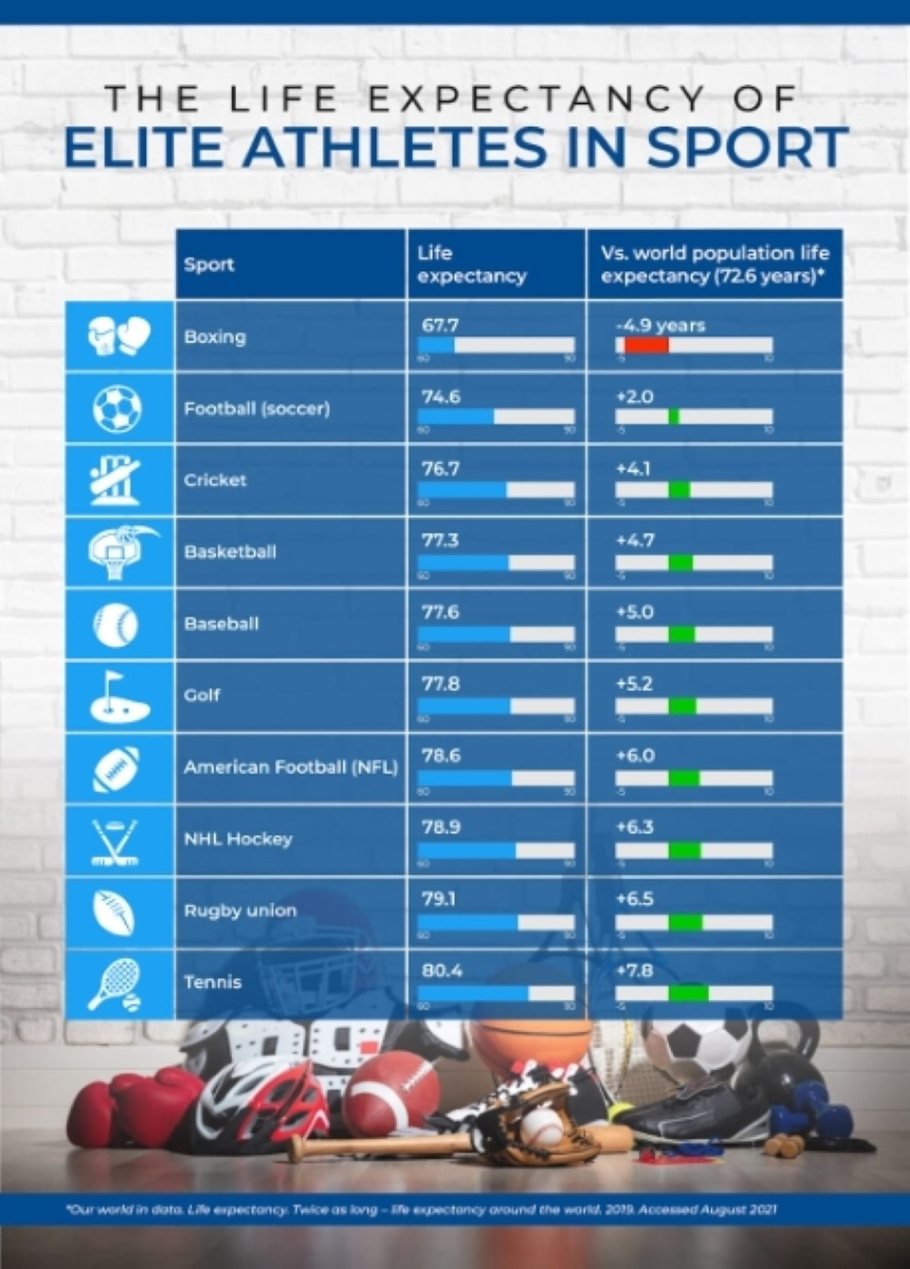Why Boxers Face the Shortest Lifespan Among Athletes
Author: Compare the Market
Published: 2021/11/15 - Updated: 2026/01/30
Publication Details: Peer-Reviewed, Findings
Category Topic: Longevity - Related Publications
Page Content: Synopsis - Introduction - Main - Insights, Updates
Synopsis: This report examines the correlation between sports participation and life expectancy, revealing that boxers have a notably shorter lifespan compared to athletes in other disciplines. While sports like tennis are associated with increased longevity, with players living over seven years longer than average, boxers face a reduced life expectancy of approximately 67.7 years—nearly five years less than the global average. This decrease is attributed to the cumulative physical injuries, particularly repetitive head trauma, experienced during their careers. The findings highlight the significant health risks associated with boxing, offering valuable insights for individuals, including seniors and those with disabilities, who are considering participation in contact sports or are concerned about the long-term effects of head injuries - Disabled World (DW).
Introduction
Boxers face a much shorter life than other sportspeople, according to new research by Compare the Market looking at links between sport, head trauma, and life expectancy. Collating data on 1,000 professional athletes across 10 different sports, the Australian company determined the average life expectancy of each discipline and compared it against the global life expectancy average.
Main Content
Life Expectancy of Elite Athletes in Sport
Boxers had the shortest life expectancy by a considerable margin. Where all other sports in the study had a life expectancy ranging from the mid-70s to early 80s, the life expectancy of a boxer was just 67.7 years of age. The sport with the longest life expectancy was tennis (80.4).
Not only does it have the lowest, but boxing is the only sport in the study that shortens a person's life span rather than lengthening it. When you compare it to the average person's life expectancy (72.6 years), professional boxers lose almost 5 years. Tennis, on the other hand, tends to extend one's life by more than 7 years.
As well as comparing life expectancy data, Compare the Market also scrutinized each athlete's cause of death to determine whether there was a link to head trauma (presumably from their professional career in sport).
Like with the life expectancy data, both boxing and football (soccer) returned the most alarming results. There are studies that suggest as many as 22.9% of the professional boxers considered had a cause of death that could be linked to head trauma.
This figure was slightly lower for football (17.2%), but still considerably higher than the other sports listed which all returned a result lower than 10%.

Table Showing Link Between Head Trauma and Cause Of Death
Professor Alan Pearce, neuroscientist with over 20 years' experience, Director of NeuroSports Labs and Adjunct Professor at La Trobe University, commented on the higher link between boxing and head injuries leading to lower life expectancy.
"When it comes to boxing, it's likely that this data reflects an effect of the accumulation of multiple bodily injuries, particularly impacts to the brain, during competitive boxing over their lifetime," Professor Pearce explained.
"There's no doubt that repetitive head knocks are associated with cognitive impairment, early onset dementia, and therefore contributing to reduced life expectancy."

Note on Methodology
We identified 100 elite athletes from each of the ten selected sports to determine average life expectancy.
The athlete must have competed at the elite level between 1949 - 1952 and been born between 1908 - 1931. These parameters ensured that the data collected was based on one generation of athletes only and that even the youngest of this generation had the time to live to the age of 90 by 2021. The study did not consider what other factors could be influencing life expectancy results in athletes.
The study did not include new and emerging sports such as parkour and skateboarding.
Insights, Analysis, and Developments
Editorial Note: The stark contrast in life expectancy between boxers and athletes from other sports underscores the critical need for enhanced safety measures and awareness regarding the long-term health implications of contact sports. As our understanding of head trauma and its consequences deepens, it becomes imperative to reassess training protocols and protective equipment to safeguard athletes' well-being. Here's the kicker: while tennis players are out there adding years to their lives, boxers are quietly taking a hit - literally and figuratively - that cuts their time short. This isn't just about stats; it's a wake-up call about what we ask of our bodies and brains in the name of sport. For folks aging or living with disabilities, it's a stark reminder that not all physical feats are created equal - some come with a cost we don't talk about enough. Maybe it's time we rethink how we protect athletes, because a life expectancy gap this big isn't just a number; it's a story of resilience, risk, and what we're willing to trade for glory - Disabled World (DW).Attribution/Source(s): This peer reviewed publication was selected for publishing by the editors of Disabled World (DW) due to its relevance to the disability community. Originally authored by Compare the Market and published on 2021/11/15, this content may have been edited for style, clarity, or brevity.